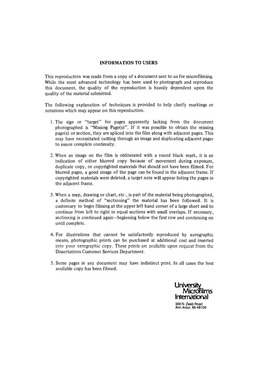| dc.contributor.author | Morgenstern, Carol Faltin, | en_US |
| dc.date.accessioned | 2013-08-16T12:28:46Z | |
| dc.date.available | 2013-08-16T12:28:46Z | |
| dc.date.issued | 1982 | en_US |
| dc.identifier.uri | https://hdl.handle.net/11244/5050 | |
| dc.description.abstract | Presently, there is no universally agreed-upon set of objectives for science education. Since science is a part of the public school curriculum, objectives adopted should assist students in achieving the purpose for which schools are maintained. | en_US |
| dc.description.abstract | The conclusion is drawn that standardized tests constructed for use with secondary school science do not measure student achievement of the rational powers. | en_US |
| dc.description.abstract | The task of using a complete set of objectives to judge the suitability of test items became enormous. The project was reduced in scope to consider one objective of a validated set of objectives for science education. Development of the rational powers was the objective selected. | en_US |
| dc.description.abstract | Objectives selected from the literature were rated by a panel of science educators as to suitability. Using this panel, a set of objectives was established. Evaluative Statements--statements which would allow measurement by a test item of an objective--were developed and judged valid by this panel. | en_US |
| dc.description.abstract | The purpose of this study is to determine whether or not standardized tests constructed for use with secondary schools science measure student achievement of the rational powers. | en_US |
| dc.description.abstract | In 1961, the National Education Association proposed that a primary purpose of education should be the development of the ability to think. The ten rational powers of recalling, imagining, classifying, generalizing, comparing, inferring, deducing, analyzing, evaluating, and synthesizing, are listed as the essence of the ability to think. | en_US |
| dc.description.abstract | A Training Manual was developed to teach test item evaluators how to apply the evaluative statements to test items. The Manual was judged valid by the panel, then used with a group of experienced high school science teachers, who, after their instruction, analyzed 648 test items from twelve randomly selected secondary school standardized science tests. | en_US |
| dc.description.abstract | Ninety percent of the test items analyzed measured student achievement of the rational power of recalling. Less than ten percent of the items collectively measured achievement of the rational powers of classifying, generalizing, inferring, deducing, evaluating, and synthesizing. No items were determined to have measured student achievement of the rational powers of imagining, comparing, and analyzing. | en_US |
| dc.format.extent | vii, 185 leaves : | en_US |
| dc.subject | Education, Sciences. | en_US |
| dc.title | An analysis of standardized tests for secondary school science. | en_US |
| dc.type | Thesis | en_US |
| dc.thesis.degree | Ph.D. | en_US |
| dc.thesis.degreeDiscipline | Jeannine Rainbolt College of Education | en_US |
| dc.note | Source: Dissertation Abstracts International, Volume: 43-09, Section: A, page: 2952. | en_US |
| ou.identifier | (UMI)AAI8302455 | en_US |
| ou.group | Jeannine Rainbolt College of Education | |
